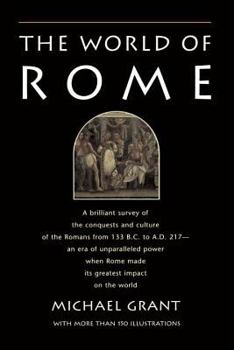The World of Rome
Select Format
Select Condition 
Book Overview
A brilliant survey of the conquests and culture of the Romans from 133 BC to AD 217--an era of unparalleled power when Rome made its greatest impact on the world. In this fresh, original interpretation of Roman history and culture, a distinguished classical scholar surveys the people and events that shaped the Roman Empire--the greatest structure of imperial government the world has ever known. Michael Grant re-creates the life and the era with its vital mixture of Italian, Greek, Near Eastern, and barbarian influences and its startling incongruities--citizen and slave, art and astrology, circus and senate, decadence and devoted patriotism. He portrays the dynamic culture which generated Roman literature, philosophy, and law, and shows how imperial administration and ideas of citizenship became the basis for the future nation-states in the western provinces. He sums up his fascinating study with a salute to Rome, the paterfamilias of the western world. "Scholarly and exciting . . . After reading this illuminating account of the prevalent conditions, beliefs and superstitions, we feel that we know how the ordinary people really lived and felt."-- New York Times Book Review With more than 150 illustrations.
Format:Paperback
Language:English
ISBN:0452008492
ISBN13:9780452008496
Release Date:March 1987
Publisher:Plume Books
Length:352 Pages
Weight:1.00 lbs.
Dimensions:0.9" x 5.4" x 8.0"
Customer Reviews
2 ratings
Dry, but Good Intro to Rome
Published by Thriftbooks.com User , 15 years ago
Michael Grant's "The World of Rome: The History of the Roman Empire from 133BC to AD217" is a book I would describe as a good introduction, useful as a foundation for someone who needs a broad overview, but anything but a page-turner. After a 20-page historical overview of the period covered, there are chapters devoted to what one might describe as all the key elements of Roman society and culture - the class system, Roman slavery, metaphysical topics including astrology, religion and philosophy and ending with cultural developments in writing, sculptor, painting and architecture. With the text running at just under 300 pages, one can use this book as a base for deeper study. Grant does have a slightly annoying habit of someone who has had lots of time to read and sometimes feels the need to make a comparison to a modern writer like Kipling for no apparent reason. A look at the long list of books he has written is indicative of a man who is indeed very well-read but perhaps has written too much. Yet in discussing Rome, Grant is clearly at the core of his expertise.
Patriotism
Published by Thriftbooks.com User , 17 years ago
Patriotism and state religion meld together. Augustus used the traditional Roman religion. Mithraism was imported from the East. Human cooperation was Cicero's concern and it was illuminated by Virgil. The MEDITATIONS of Marcus Aurelius do not provide a connected unity. Romans kept at their houses death masks of their ancestors. Portraits of the dead appeared earlier on Etruscan funeral urns. Numerous and varied styles of painting flourished in the Augustan Age. Clean sandy earth assisted the architects in their creations. In addition to the use of concrete, the exploitation of the arch was a Roman achievement. The Senate monopolized power in Rome. Sulla used his power to shape up of the Senate oligarchy. After him political affairs were corrupt, chaotic, violent. Caesar became dictator for life, Augustus managed to institute a constitutional settlement. The Senate of the emperors undertook a good deal of business. Most rulers tried to maintain the republican facade. Communication in the empire was possible because there was an amazingly comprehensive network of roads. Tax collection in the provinces was delegated to tax farmers. Xenophobia was not prevalent in Rome. People of the western provinces became Romanized. Roman rule was tolerable because it carried with it the gift of peace. Greeks welcomed the imperial system. The Romans found it convenient to retain the city-states. Military crises caused Rome to interfere with the self-government of the provincial cities in 300 A.D. There was interregional commerce. Trade joined agriculture as primary factors in the economy. The social pyramid was high and steep. Roman citizenship had been held by the free Romans. It was extended to all Italians living south of the Po. Retired soldiers were made civilian settlers in the empire. The Romans treated law in a scientific way. The classical period of Roman law came later than the classical period of literature. At the end of the republic there was anarchy. Democracy was out of the question when Augustus controlled the empire. Imperial policy was to make the people happy with cheap food and spectacle. Towns and cities depended on the countryside. Tempers frayed. There was industry and there were labor disputes. The Roman will to power was expressed in cruelty. The gladitorial contests were of Etruscan origin. More cruel were contests between humans and wild animals. In Rome patriotism and state religion were indistinguishable. Augustus used religion to support his political acts. Romans wanted something more. They feared fate and believed in astrology. There were mystery cults. Dionysus, Aesculapius, Isis, and Cybele were the focus of cults. There were also Mithraic traditions. Mithras, the renewer of life, was associated with the seasons. In philosophy Epicurians and Stoics contended with each other. Circero and Seneca leaned in the direction of Stoicism. Marcus Aurelius's writings show a frequent m





